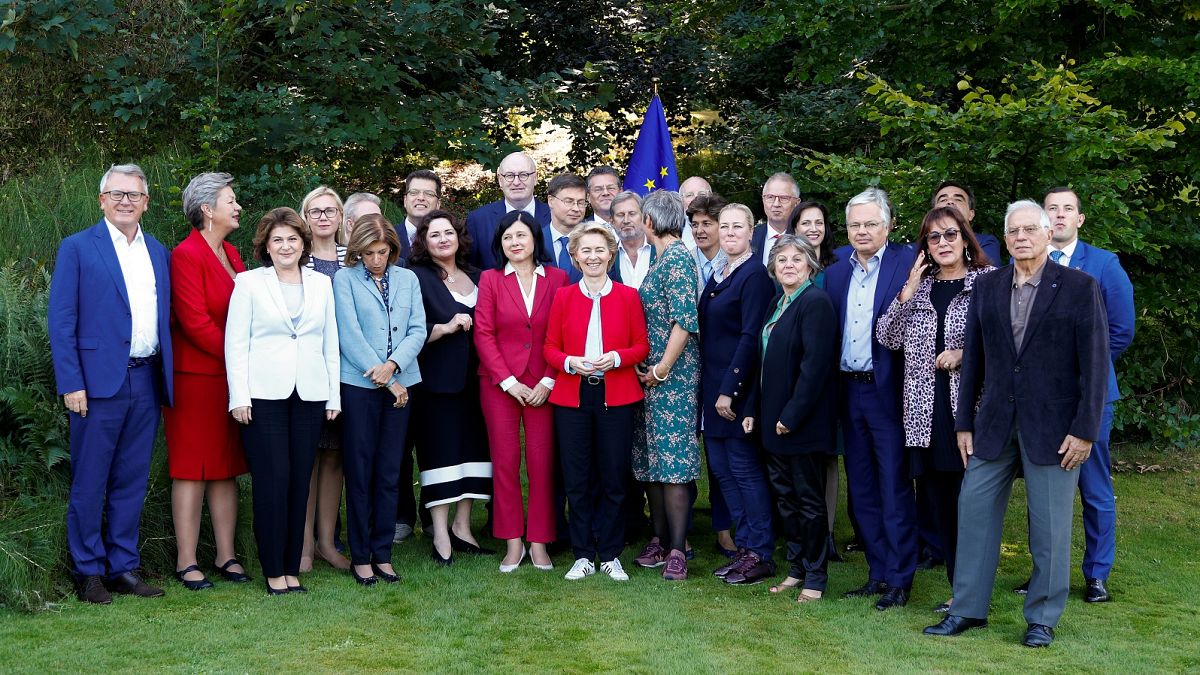
- Select a language for the TTS:
- UK English Female
- UK English Male
- US English Female
- US English Male
- Australian Female
- Australian Male
- Language selected: (auto detect) - EN
Play all audios:
By RADU MAGDIN Published on 11/10/2019 - 17:43 GMT+2 The opinions expressed in this article are those of the author and do not represent in any way the editorial position of
Euronews. The birth of the new European Commission has not been an exercise in smoothness. The hearings in the European Parliament have posed real challenges for the candidates, whose
competence and integrity have been questioned more than once. Tension, competition and adversity have been the defining sentiments and the default strategies for how existential debates were
approached. As this process comes to an end, let’s all hope that the new Commission will leave the all doubts behind, will be bold and focused, and will live up to the expectations of many
anxious Europeans. However, this optimism will be no more than self-deception without more “meat to the bones” of actionable plans, at least in relation to the essential discussion of the
day – a response to great-power competition. Despite misalignments and confrontation, a certain sense of unity dominates the discourse of politicians and pundits about the (new) strategic
role of the Union. President-elect Ursula von der Leyen set the tone speaking about a “geopolitical” Commission, one that is more attuned to the transformations that have taken place in the
past five years; it is more than the typical vision of a former defence minister, in fact a realistic take on what the US, China, and, from time to time, Russia are doing on the world stage.
The next EU foreign policy chief warns of EU irrelevance, whereas former Commissioner Malmström rightly raises the point about how EU should bring together security, trade and economic
considerations under the broader umbrella of a strategic response to what the other geopolitical elephants are doing. Analysts call for Europe to have a “power project”, to become a global
player by internalising and mastering great-power competition. But for “strategic autonomy” to happen, much more needs to be done. The hearing of Josep Borrell as the EU’s next foreign
affairs chief sent the message that at least the challenge is well understood, although the response remains unclear. The key here is that Europe is recognising that great-power competition
is back and that autopilot solutions, or knee-jerk reactions, are no more than the illusion of a plan. The game that Europe loves so much to play, multilateralism, is under threat and the
liberal order is undermined by various actors, starting with the supposedly guarantor of the current global arrangement, the United States. Despite the difference of nuances, it is somehow
refreshing to see that both Borrell and, in her last weeks in the role, Federica Mogherini, are raising the profile of the issue and are trying to put it on the agenda of the member states’
and European political leaders. The nature of the problem, however, defies the typically incremental and fragmented answer the European Union has embraced as its modus operandi. A
geopolitical Commission should do more than find instruments to make the internal market work better for European companies and leverage this advantage in relation to China and the US. It
should do more than ensuring a pacified neighbourhood that does not pose security and migration problems: It should do more than preserve the key institutions behind globalisation and world
trade. It should do more than presenting a plan for enhanced military and defence cooperation strong enough to reduce strategic dependence on the Americans. There are limits to what the
European Commission can do when calling on the political leaders to lean in on these strategic concerns. Putting forward a new EU Global strategy (the previous one was launched in 2016 and
was immediately made obsolete by Brexit and the Trump election, a harsh but fair characterization by the European Council on Foreign Relations in a July 2019 policy brief) based on old
recipes will simply not do. The strategic autonomy issue should be first and foremost a political matter. I argue that we desperately need a pan-European brainstorming session aimed at
developing a grand strategy for Europe; one to guide our trade policy, our economic and investment relations with US, China, and Russia, the development of the internal market and the future
of economic and defence integration, as well as our engagement in Africa, Western Balkans and the Eastern Partnership countries. We have to fully internalise the nature of this power
transition period, to debate whether this is the consequence of a waning US or of deeper trends related to capitalism, globalisation, and security concerns. We have to measure and we have to
act. French Minister Bruno Le Maire likes to talk about Europe in terms of a “new empire”, although this take could raise eyebrows, especially as it contradicts our dedication to
multilateralism. Guy Verhofstadt shares a similar point of view, although I think that our soft power could be put to better use. We are strong because we are a force of attraction, not one
of imposition. An empire dominates and dictates, and Europe, given its DNA, should become a different kind of geopolitical animal. But, irrespective of how we define our strategy and what we
call our strategic position (although it should be noted that communication in an era of great-power competition is more important than ever, with the power of narratives a key component in
the battle for hearts and minds), we should embrace a bold vision, rooted in a shared culture among all the member states; a vision that is a mix of common goals and tactical flexibility.
Although we are not in situation that plays to our past strengths, we have to show that we are perfectly able, not only to master a game that was imposed on us, but that we have the
strategic intelligence to transform it to our liking and advantage. The mantra of our actions? The new hashtag #EUstrivesformore says it all. It’s aspirational and suggestive enough that we
mean business. Less anxiety and gloom about decay, more hands on ideas and action. A final point is in order. For this to happen, not only political will is required, but also a renewed
sense of European unity. This cannot be achieved through punitive actions. The East-West divides should be left behind, and the desire to openly punish the troublemakers put on hold. Let’s
be serious: Europe does not look great when it uses bureaucratic procedures in the European Parliament (this is what happened to the Romanian and Hungarian-designated commissioners whose
rejection was rather political than based on solid integrity/conflict of interest issues) to score easy points against, for example, some of the Visegrads. Picking internal and external
fights at the same time - using lots of our energy - is a choice not in keeping with the idea of a grand strategy, whose goal is to give everyone a clear rationale and to put an end to the
attempts to build narrow national fixes. In the end, if everything goes well, great-power competition could be the silver lining for the EU, an antidote not only to strategic irrelevance,
but also to the pernicious idea of multi-speed Europe. If not, countries will act based on a mix of peril and attraction, and push harder for regional formats, further dividing the EU and
making it less effective. Furthermore, their MEPs may even be tempted to vote down in vengeance the Commission who finally says strives for more. * _Radu Magdin is a strategic communications
analyst and consultant, and a former prime ministerial advisor in Romania and Moldova._ ____________ Are you a recognised expert in your field? At Euronews, we believe all views matter.
Contact us at [email protected] to send pitches or submissions and be part of the conversation.









